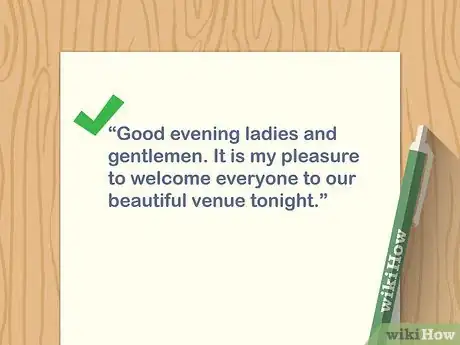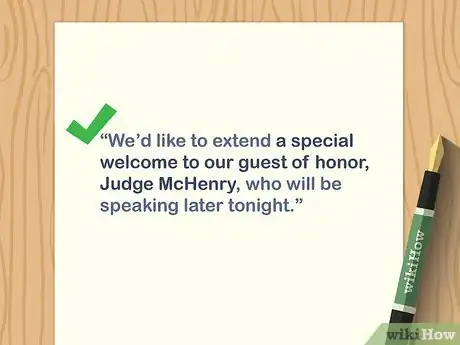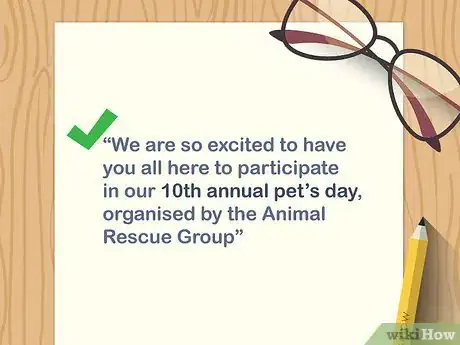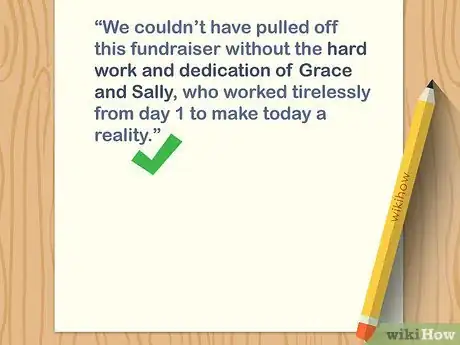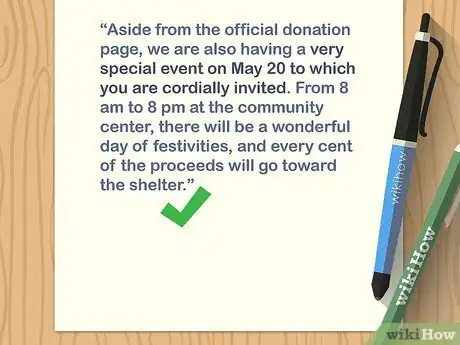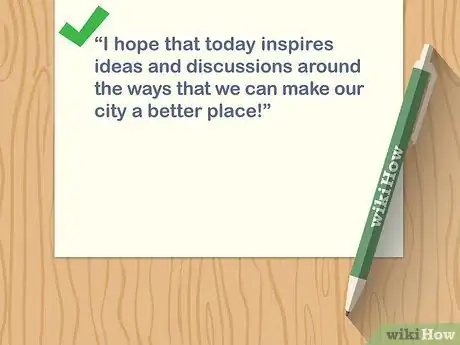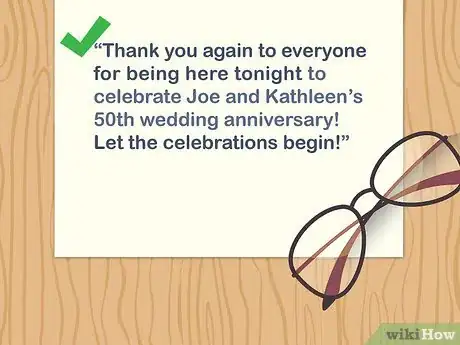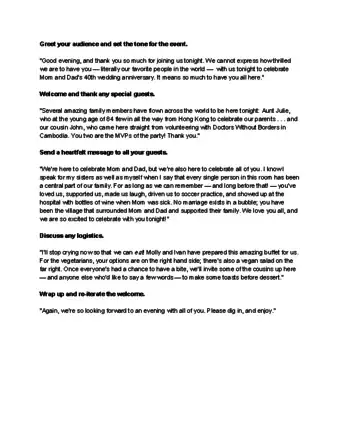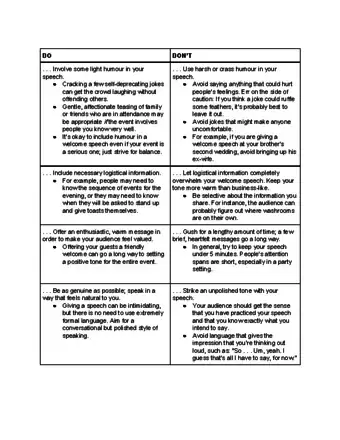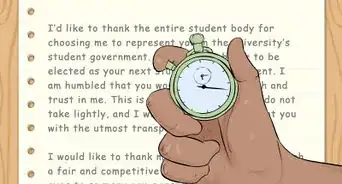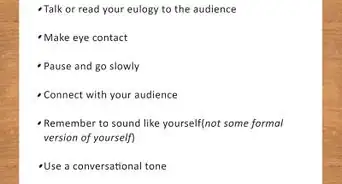This article was co-authored by Patrick Muñoz. Patrick is an internationally recognized Voice & Speech Coach, focusing on public speaking, vocal power, accent and dialects, accent reduction, voiceover, acting and speech therapy. He has worked with clients such as Penelope Cruz, Eva Longoria, and Roselyn Sanchez. He was voted LA's Favorite Voice and Dialect Coach by BACKSTAGE, is the voice and speech coach for Disney and Turner Classic Movies, and is a member of Voice and Speech Trainers Association.
wikiHow marks an article as reader-approved once it receives enough positive feedback. In this case, 81% of readers who voted found the article helpful, earning it our reader-approved status.
This article has been viewed 1,335,560 times.
Are you on welcome speech duty for an upcoming program or event? You’ve got nothing to worry about—with the right format and tone, it’s super easy to write and present a welcome speech for just about any occasion. We’ve outlined everything you need to know, from your opening greetings and acknowledgments, to establishing the right tone and nailing your closing remarks. You’ve got this in the bag!
Steps
Greeting the Audience
-
1Welcome the audience using serious language for a formal occasion. Pick an appropriate greeting such as, "Good evening ladies and gentlemen." Then welcome the audience to the event using a phrase such as, "It is my pleasure to welcome everyone to our beautiful venue tonight."[1]
- Keep the tone more serious if it's an important occasion. Use more formal language and don't crack any inappropriate jokes. For example, at a wake, you might say, "We're so glad to have you all here tonight. We appreciate your presence at this difficult time."
-
2Greet guests informally by using light-hearted language. Choose a simple and straightforward greeting such as, "Good morning everyone!" Express your gratitude towards the guests for attending by using a phrase such as, "It's so wonderful to see you all here on this sunny day."[2]
- For an event with close friends and family, more informal language might be appropriate. Include a few jokes and keep your speech more lighthearted.
EXPERT TIPPatrick is an internationally recognized Voice & Speech Coach, focusing on public speaking, vocal power, accent and dialects, accent reduction, voiceover, acting and speech therapy. He has worked with clients such as Penelope Cruz, Eva Longoria, and Roselyn Sanchez. He was voted LA's Favorite Voice and Dialect Coach by BACKSTAGE, is the voice and speech coach for Disney and Turner Classic Movies, and is a member of Voice and Speech Trainers Association.Voice & Speech Coach
 Patrick Muñoz
Patrick Muñoz
Voice & Speech CoachGrab your audience's attention with a strong opening. Start with a loud voice and a strong presence that welcomes everyone and gets them involved. Ask a question they can respond to or tell a joke — anything to connect with the audience. Do something that grabs their attention and excites them and makes them thrilled about the event.
Advertisement -
3Add individual greetings for any special guests. Include the names of special guests that are part of the audience. Gesture to and look at the special guests as you mention them.
- Special guests include any people of honor, those that may play a particularly important part in the event, or those who have traveled a long way to be there.
- Make sure that you practice all of names, titles, and pronunciations of the special guests before your speech.[3]
- For example you could say, "We'd like to extend a special welcome to our guest of honor, Judge McHenry, who will be speaking later tonight."
- Alternatively to welcome a group of people you might say, "While we're excited to have you all here tonight, we'd especially like to say welcome to the students from Johnson Middle School."
-
4Introduce the event itself. Provide a short introduction to the name and purpose of the event. Say the name and age of the event if it's relevant, and talk a little about the organisation who is behind the event.[4]
- For an informal event such as a birthday party, you could say, "We're so happy to have you here tonight to eat, drink, and celebrate another year of Jessica's life. Now, let's get to it."
- For a more formal event such as one run by an organisation, you could say, “We are so excited to have you all here to participate in our 10th annual pet’s day, organised by the Animal Rescue Group.”
Forming the Body of the Speech
-
1Acknowledge those who have played an important part in the event. Mention 2-3 people who have helped to turn the event from an idea into reality. State their names and the role that each person played.[5]
- An example of acknowledging individual people is saying, “We couldn’t have pulled off this fundraiser without the hard work and dedication of Grace and Sally, who worked tirelessly from day 1 to make today a reality.”
- Avoid reading off a long list of people or sponsors, as your audience will begin to get bored. Stick to just a handful of highlights.
-
2Mention any parts of the event that are of special importance. Point out what's coming up later on in the event or over the next few days, if applicable. Pick the parts that are the most important, and give people encouragement about anything they should stick around for or pay special attention to.[6]
- For instance, at a conference, you might point out when the dinner will be held, or where particular sessions will take place.
- At a wedding reception, you might note when dancing will start or when the cake will be served.
-
3Reiterate your welcoming line. Welcome the guests again, but this time in a way that relates to the overview that you just mentioned. For example at an informal gathering you could say, "I'm excited to get to know all of the new faces here during our legendary cricket game!" For a more formal event, wish everyone a smooth transition for the next part of the event.[7]
- Alternatively, you could end the body of your speech during an informal gathering by saying, “I can't wait to see you all out on the dancefloor!”
Ending the Speech
-
1Say that you hope the audience enjoys the event, if applicable. Pass on your warm wishes to the audience for the rest of the event. For example, at a conference you might say, “I hope that you all enjoy the exciting speakers to come!”[8]
- You could also say that you hope that the audience takes something away from the event. For example, “I hope that today inspires ideas and discussions around the ways that we can make our city a better place!”
-
2Introduce the next speaker if necessary. At a big, formal event, you should prepare a formal introduction, including a relevant short biography of the person and their related organisation. At an informal event, a short and fun introduction is appropriate.[9]
- At a formal event, you might say, "Now, for our speaker. Rebecca Roberts comes here from Montreal, Canada, and she is a leading expert in the study of the human brain. She'll be speaking tonight on what drives humans to make decisions. Let's welcome her."
- For a more informal event such as a party, you could say, “Next up is Sam, who has been Kyle’s best friend for 10 years strong. He has a decade of embarrassing stories about Kyle to share with us tonight!"
-
3Thank the audience for attending. Say a brief sentence or 2 expressing your gratitude on behalf of the event. Keep it short and to the point. For example at an informal event you could say, "Thank you to everyone here for coming along tonight."[10]
- Alternatively you might say, “Thank you again to everyone for being here tonight to celebrate Joe and Kathleen’s 50th wedding anniversary! Let the celebrations begin!”
-
4Keep your speech within a suitable time limit. The event will dictate how long it's appropriate to speak for. Usually shorter is better as most of the time, people just want to get on with the event. Around 1-2 minutes is generally appropriate for smaller events, and around 5 minutes is usual for bigger and more formal events such as conferences.[11]
- If you are unsure, ask the organiser or host what an appropriate length of time for your speech will be.
Community Q&A
-
QuestionHow do you write a welcome speech for a conference?
 wikiHow Staff EditorThis answer was written by one of our trained team of researchers who validated it for accuracy and comprehensiveness.
wikiHow Staff EditorThis answer was written by one of our trained team of researchers who validated it for accuracy and comprehensiveness.
Staff Answer wikiHow Staff EditorStaff AnswerYou can start by mentioning the title of the conference (e.g., the 21st Annual Meeting of the P. G. Wodehouse Society) and then going on to briefly thank any sponsors and other supporters who helped make it possible. Say something about the theme of the conference and a few general words about the speakers. The welcoming speech can also be a good opportunity to bring up important news and announcements, but keep it brief! You might end by thanking the audience and introducing the first speaker.
wikiHow Staff EditorStaff AnswerYou can start by mentioning the title of the conference (e.g., the 21st Annual Meeting of the P. G. Wodehouse Society) and then going on to briefly thank any sponsors and other supporters who helped make it possible. Say something about the theme of the conference and a few general words about the speakers. The welcoming speech can also be a good opportunity to bring up important news and announcements, but keep it brief! You might end by thanking the audience and introducing the first speaker. -
QuestionHow can I find good quotes to include in a welcome speech?
 wikiHow Staff EditorThis answer was written by one of our trained team of researchers who validated it for accuracy and comprehensiveness.
wikiHow Staff EditorThis answer was written by one of our trained team of researchers who validated it for accuracy and comprehensiveness.
Staff Answer wikiHow Staff EditorStaff AnswerIf you want to use a quote in your speech, try to pick one that’s relevant to the theme of the event. For example, if you’re introducing a seminar on elementary education, you might choose a quote about teaching by Maria Montessori. You can use a source like BrainyQuote.com or Wikiquote.org to find quotes by topic or author.
wikiHow Staff EditorStaff AnswerIf you want to use a quote in your speech, try to pick one that’s relevant to the theme of the event. For example, if you’re introducing a seminar on elementary education, you might choose a quote about teaching by Maria Montessori. You can use a source like BrainyQuote.com or Wikiquote.org to find quotes by topic or author. -
QuestionHow do I start a speech for a school?
 Community AnswerSpeeches for schools usually start with a statement or question that will get everyone's attention on you. Your opening remarks should make clear what you're planning to talk about.
Community AnswerSpeeches for schools usually start with a statement or question that will get everyone's attention on you. Your opening remarks should make clear what you're planning to talk about.
References
- ↑ https://www.judgify.me/blog/write-welcome-speech-event/
- ↑ https://www.judgify.me/blog/write-welcome-speech-event/
- ↑ http://grammar.yourdictionary.com/style-and-usage/writing-an-effective-welcome-speech.html
- ↑ https://www.judgify.me/blog/write-welcome-speech-event/
- ↑ https://www.judgify.me/blog/write-welcome-speech-event/
- ↑ https://penandthepad.com/how-5574707-write-welcome-speech.html
- ↑ https://www.judgify.me/blog/write-welcome-speech-event/
- ↑ https://penandthepad.com/how-5574707-write-welcome-speech.html
- ↑ https://www.publicwords.com/2011/11/26/how-to-introduce-a-speaker-the-art-of-giving-and-receiving-a-great-introduction/
About This Article
To write a welcome speech, start with a greeting to your audience that’s appropriate to the situation. For example, you could try “Good evening ladies and gentlemen” if you’re introducing a formal event, or “Thank you everyone for coming on this sunny day” for a more relaxed occasion. After you’ve finished the greeting, introduce the event by talking about who organized it and what its purpose is. In the main body of your speech, acknowledge 2 or 3 people who played important parts in organizing the event. You should also emphasize special parts of the event that people should pay attention to, such as where dinner will be or where a conference session will take place. When you’re ready to conclude your speech, tell the audience to enjoy the event by saying something like “I hope you all enjoy the exciting speakers to come.” Finish your speech by thanking the audience for attending. For tips on how to introduce people at a special occasion, read on!
